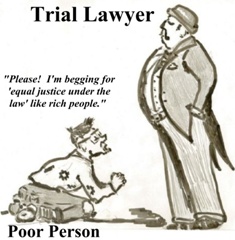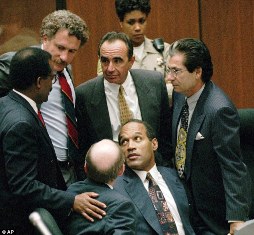Bail Education School


Riana Buffin and Crystal
Patterson, et al.,
Plaintiffs
v.
This City and County of San Francisco and the State of California,
Defendants
Was the O.J. Simpson Murder Trial an example of so-called “Equal Justice Under Law?”
Case No. 15-CV-4959 (YGR)
(Class Action)Should Trial Lawyers Take a Closer Look at Buffin and Patterson v. The City and County of San Francisco?
Does the “...wealth-based” Trial Lawyer’s “scheme”
Create “two systems of justice?”
Opinion Editorial and Questions by Rex Venator, Bounty Hunter
December 28, 2015
So Washington D.C. lawyers moved a San Francisco district (benched by lawyers) court to declare San Francisco’s bail (determined by lawyers) schedule a “wealth-based scheme detention (that) unconstitutionally imprisons arrestees based on their wealth-status thereby creating two systems of justice: one for the rich another for people who are poor” thereby forming the basis to request injunctive relief to be decided by, well, lawyers.
I find the argument, as a simple bounty hunter, quixotic, paradoxical, and, if one merely gazes a year or two past tomorrow, is this not a serious threat to TRIAL LAWYERS?
Access to legal representation and bail are each available to newly arrested people, but making an argument that poor people can’t raise bail overlooks the fact that poor people also cannot afford an O.J. Simpson like “dream team” to the extent that one has to wonder if there really is so-called “Equal Justice Under Law” when it comes to securing competent legal representation.
For example, a young adult male just starting out in the world and with no assets “catches a case” and is assigned a government public defender; however, his coconspirator’s parents are rich and retain the second defendant a $650.00 an hour lawyer. Now apply the argument the D.C. lawyers made about bail creating “two classes” of defendants to this example and it isn’t difficult to imagine or even witness firsthand how “two classes” of people are made.
Where exactly is “Equal Justice Under Law” when there are two classes of people: one class that can afford expensive lawyers and the other class that has no money and therefore cannot, irrespective if we are talking about criminal law or civil law with private bail being a private civil matter injected into an ongoing criminal matter with bail being set by judges who are lawyers.
I’m asking because I am not highly educated, nor have I had any formal legal training, so I’ll rephrase my question differently.
If the bail schedule is a wealth-based scheme then isn’t it also true that trial lawyers, who set their own hourly rates based on skills, experience, a proven track record of success, or, maybe just a prestigious address, more of a wealth-based scheme—like the D.C. Lawyers?
Stated differently, if lawyers all agree that high bail is unfair to poor people then perhaps it is time to do away with private trial lawyers who set their own fees and then let the government determine what all lawyers can charge all peoples in all matters for legal representation so that everyone is treated equally under the law if we are to follow the shortsighted arguments of the D.C. Lawyers, yes?
Most people in criminal and civil trouble cannot afford a “dream team” of the best legal minds in the United States, and if we make it so then it stands to reason that “dream teams” will no longer exist because the best legal minds may be disinclined to become trial lawyers because trial lawyers decided that bail schedules, set by judges, are not fair; hence, we may have what is called a “clashing of logics” offered up by lawyers that will predictably have an insidious eroding affect on lawyers if California lawyers agree with the D.C. lawyers?
Does the wealth-based trial lawyer scheme create two systems of justice? I’m a simple man and am asking because I don’t know; indeed, maybe a trial lawyer could help me find an answer, but I shouldn’t be made to pay more than I can afford because that would unfairly create two classes of people, yes?
My final question is this: are trial lawyers a different class of people than bail people with the former charging people whatever they want while the latter charge what lawyers (judges) tell them they can charge to all people notwithstanding if people in need of bail are rich or poor? Wait. A trial lawyer is unlikely to take a case from a poor person that has no class action potential, but a bail agent will post a bond for a poor person—so exactly which system is a “wealth-based scheme?”
I’m sure the lawyers involved will be fair to all and not expect to get rich through this process of deciding whether or not one so-called scheme is actually reflective of an incontrovertibly wealth-based scheme designed for wealthy folks to afford “dream teams” right?
Yeah, my head hurts too ~ Rex, Tracy, California.
Why the Democrats for Life of America do not endorse Republicans?
“It is the current policy of Democrats for Life of America never to formally endorse or provide institutional backing to any candidate who is not both a Democrat and pro-life. To do so would be to blunt our prophetic voice within the Democratic big tent and remove our reason for being.”
ORDER by Judge Yvonne Gonzalez Rogers denying 2 Motion for Temporary Restraining Order and Setting Teleconference. (fs, COURT STAFF) (Filed on 10/30/2015)
“You want me to issue an order to all of the judges of San Francisco telling them all of their orders are unconstitutional?”
“It is fundamentally unclear to me the legal theory under which you are proceeding.”
"You don't have the judges in this suit, and frankly, I don't think you can sue them."
"Your legal theory seems ambiguous and unformed."
"I understand what you're hoping to achieve, but you still have to do the legal analysis, and pontificating at the mike is not legal analysis."
"I hear your argument, but when you have statements in your claim like the CCSF operates the Sheriff's Department, county jail and Superior Court, it clearly suggests to me you don't understand how it works. The Superior Court is a constitutional branch of the California government. It gives me no confidence in your ability to have articulated something that may be successful."
~ U.S. District Court Judge Yvonne Gonzalez Rogers
WELCHEN v. HARRIS
No. 2:16-cv-00185-TLN-KJN.
GARY WAYNE WELCHEN, Plaintiff, v. KAMALA HARRIS and COUNTY OF SACRAMENTO, Defendants.
United States District Court, E.D. California.
February 4, 2016.
ORDER DENYING MOTION FOR TEMPORARY RESTRAINING ORDER
TROY L. NUNLEY, District Judge.
“This matter is before the Court pursuant to Plaintiff Gary Welchen's (‘Plaintiff’) motion for temporary restraining order. (ECF No. 2.) For the reasons set forth below, Plaintiff's motion is hereby DENIED.”
“Plaintiff asserts that the bail scheme in Sacramento is unconstitutional because it is a ‘wealth-based detention scheme that penalizes all indigent arrestees.’ (ECF No. 2 at 3.) Plaintiff has filed the instant case as a class action and moves this Court for a temporary restraining order ‘prohibiting Defendants' wealth-based detention scheme and requiring that pretrial release or detention decisions be based on factors other than wealth-status.’ (ECF No. 2 at 2.)”
“At the outset, the Court notes that Plaintiff's briefing is replete with one-liner platitudes concerning equal justice and wealth status. However, the briefing fails to address the other factors that the state court considers in deciding whether bail should be applied. In essence, Plaintiff's briefing makes overarching legal conclusions, but fails to provide this Court with facts that would enable the Court to grant the relief sought by Plaintiff. Plaintiff's failure is more notable in this situation where Plaintiff is asking this Court to upset the status quo. See Martin, 740 F. 2d at 675 (‘a party seeks mandatory preliminary relief that goes well beyond maintaining the status quo pendente lite, courts should be extremely cautious about issuing a preliminary injunction.’) Furthermore, the case law cited by Plaintiff is not binding on this Court, nor does the information before this Court provide enough detail to determine whether the bail systems that other districts have found to be unconstitutional are similar to that which is utilized in Sacramento. As such, this Court cannot find that Plaintiff is likely to succeed on the merits of this case, and this factor weighs in favor of denying injunctive relief.”
“Because Plaintiff has failed to show a likelihood of success or irreparable harm, the Court need not address the other two Winter factors since Plaintiff cannot succeed under Winter or the Ninth Circuit's sliding scale approach. See Winter, 555 U.S. at 20; Alliance for the Wild Rockies, 632 F.3d at 1135 (Winter requires a plaintiff to make a showing on all of the Winter factors); see also Lopez v. Brewer, 680 F.3d 1068, 1072 (9th Cir. 2012) (sliding scale approach requires a likelihood of irreparable injury to the plaintiff).”
“For the foregoing reasons, this Court finds that injunctive relief at this juncture of the litigation is not appropriate. As such, Plaintiff's Motion for Temporary Restraining Order (ECF No. 2) is hereby DENIED.”
IT IS SO ORDERED.
Copyright 2015 - 2016 www.adventuretrades.com - A Subsidiary of Bailspeak, All Rights Reserved